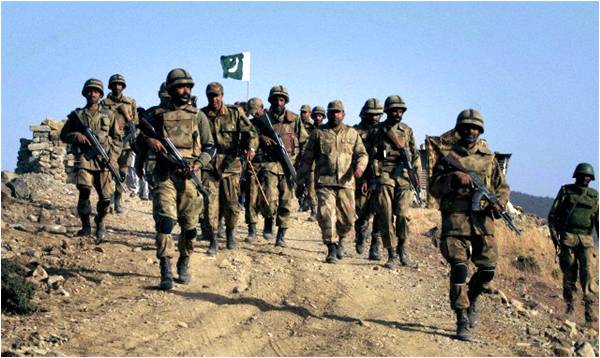
Taliban threatened to burn down Islamabad and Lahore to ashes, as troops with air-support encircled them for a “decisive battle.” In face-to-face combat, they do not stand a chance. But intelligence agencies have warned about the presence of several terrorist sleeper cells in the major cities of Pakistan. According to some analysts, the Karachi airport attack was the handiwork of one such cell.
The success of operation Zarb-e-Azb hinges upon credible actionable intelligence. The fight in North Waziristan would come to an end soon, bu its consequences will persist for long.
“The most serious threat at the moment is from the sleeper cells of terrorists,” said former Inspector General of Police Shaukat Javed. He admits that the capability of civilian agencies to gather actionable intelligence is not up to the mark, but believes they can be strengthened. Veteran analyst Ejaz Haider says the only way to stop militants from carrying out more attacks like that on the Karachi airport is to identify and stop them before they act.
Since the announcement of military operation in North Waziristan, every major political party seems to be standing behind the armed forces. Even Dr Tahirul Qadri, who had his workers got engaged in bloody conflict with the police in Lahore on Tuesday, endorsed the operation.
[quote]The success of the operation depends on credible intelligence[/quote]
Imran Khan of Pakistan Tehrik-e-Insaaf (PTI), who was nicknamed Taliban Khan, also supports the operation. However, he emphasized not to close the doors of negotiation with those Taliban who are still willing to talk.
“The entire nation needs to stand united,” the prime minster told the parliament. He said the operation would continue until all the terrorists camps had been eliminated, and that his government would make sure Pakistan will never be a safe haven for militants any more.
A source said the security forces might divide North Waziristan into two strategic blocks. The area of Mir Ali is infested with foreign militants, especially Uzbeks. Many of them have refused to flee and will face the army. The military believes they do not stand a chance in a prolonged conflict, with their supply lines severed. The government has already requested ISAF troops in Afghanistan to help control cross-border movement. The second block is centered in Miranshah – the sanctuary of Tehrik-e-Taliban Pakistan (TTP). Weakened by infighting, the TTP is not in a position to fight for too long.
A former intelligence official who has lived in North Waziristan said the security forces might not venture into Shawal and Datta Khel areas, which consist of dense forests and mountains that provide desirable sanctuaries to militants. They will reply on air attacks in such locations.
In anticipation of terrorist attacks, extraordinary security measures have been made at airports, railway stations and other important public buildings and installations.
The international community, especially the United States, has welcomed operation Zarb-e-Azb. The Americans have reportedly offered drone support – an offer that may not be accepted publicly because of political consequences in Pakistan.
Shahzad Raza is an Islamabad-based journalist
Twitter: Shahzadrez
The success of operation Zarb-e-Azb hinges upon credible actionable intelligence. The fight in North Waziristan would come to an end soon, bu its consequences will persist for long.
“The most serious threat at the moment is from the sleeper cells of terrorists,” said former Inspector General of Police Shaukat Javed. He admits that the capability of civilian agencies to gather actionable intelligence is not up to the mark, but believes they can be strengthened. Veteran analyst Ejaz Haider says the only way to stop militants from carrying out more attacks like that on the Karachi airport is to identify and stop them before they act.
Since the announcement of military operation in North Waziristan, every major political party seems to be standing behind the armed forces. Even Dr Tahirul Qadri, who had his workers got engaged in bloody conflict with the police in Lahore on Tuesday, endorsed the operation.
[quote]The success of the operation depends on credible intelligence[/quote]
Imran Khan of Pakistan Tehrik-e-Insaaf (PTI), who was nicknamed Taliban Khan, also supports the operation. However, he emphasized not to close the doors of negotiation with those Taliban who are still willing to talk.
“The entire nation needs to stand united,” the prime minster told the parliament. He said the operation would continue until all the terrorists camps had been eliminated, and that his government would make sure Pakistan will never be a safe haven for militants any more.
A source said the security forces might divide North Waziristan into two strategic blocks. The area of Mir Ali is infested with foreign militants, especially Uzbeks. Many of them have refused to flee and will face the army. The military believes they do not stand a chance in a prolonged conflict, with their supply lines severed. The government has already requested ISAF troops in Afghanistan to help control cross-border movement. The second block is centered in Miranshah – the sanctuary of Tehrik-e-Taliban Pakistan (TTP). Weakened by infighting, the TTP is not in a position to fight for too long.
A former intelligence official who has lived in North Waziristan said the security forces might not venture into Shawal and Datta Khel areas, which consist of dense forests and mountains that provide desirable sanctuaries to militants. They will reply on air attacks in such locations.
In anticipation of terrorist attacks, extraordinary security measures have been made at airports, railway stations and other important public buildings and installations.
The international community, especially the United States, has welcomed operation Zarb-e-Azb. The Americans have reportedly offered drone support – an offer that may not be accepted publicly because of political consequences in Pakistan.
Shahzad Raza is an Islamabad-based journalist
Twitter: Shahzadrez

